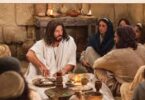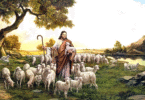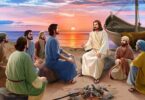Third Sunday of Season of Lent
Scriptures: Exodus 20:1-17; Ps. 18:1-11; 1 Cor. 1:18, 22-25; John 2:13-25
We are now into the third Sunday of Lent. We are reflecting on the theme of journey. This theme is inspired by our beloved Pope Francis’ homily on Ash Wednesday, inviting us to make the journey of forty days in the season of Lent.
Hence, on the first Sunday, we reflected on how God accompanies us in our journey; on the second Sunday, we reflected that we face tough climbs in our journey but once we are on a mountain top, we get a better view of life. Today, we shall focus on yet another aspect of the journey on the basis of today’s liturgy i.e. we need rules for better conduct during our journey. It helps us to reach our destination.
The importance of rules is often viewed by many as burdensome. People find it difficult to accept rules, regulations, laws, etc. as they are seen to take away our freedom. But there is another side, the rules are made to run the society smoothly. They guide society to achieve common goals. Without the rules, we would have been in conflict all the time. The rules/laws help us in each and every aspect of life. It helps us in our spiritual life too.
We have seen it in the lives of Israelites. The people led their lives by the law. They call it the Torah, the first five books of the Bible. It is interesting to see the relationship between the journey and the law in their lives. The bible gives us a vivid account of this relationship. The Israelites from the days of Abraham made journeys from one place to another. Among their famous journeys, was the journey from Egypt to the Promised Land. It is known as the Passover.
The Israelites experienced God’s presence in their midst during this journey but soon they turned away from God. They blamed God for their misery in the wilderness. They grumbled at God for everything. They grumbled when they saw the Pharaoh’s mighty army near the Red Sea (Ex. 14:10-12); they grumbled when they found bitter waters at Marah (Ex 15:22-24); they grumbled when they were hungry (Ex. 16:1-3); they complained about the water at Rephidim (Ex. 17:1-4) and when Moses took time to come down from Mt. Sinai (Ex 35).
Today’s first reading tells us that even in the unfaithfulness of Israel, God made a covenant with the people of Israel on Mt. Sinai. In this covenant, He promised them that He would make them His own people, He would lead them to the Promised land and protect them from their enemies. And in return, the people agreed to obey the commandments of the Lord i.e. the Ten commandments. Moses was the mediator between God and the people. The ten commandments became the guidelines for their life or the rule for their spiritual journey.
These ten commandments’ first part demanded that they must give first place to God in their lives before anything else. They were not allowed to replace God’s love. The second part of the commandments sprung from the first part. It focused on the love of neighbour. If someone loves God, then they will keep the second part of the ten commandments. The failure to keep the love of God means failure to respect his creation i.e. fellow human beings. Respect for others comes from the love of God. Jesus beautifully combined both these commandments into one because He knew both were of utmost importance for the journey of life. (Mt. 22: 36-40). While commenting on the laws of Moses, Jesus tells us in the Gospel, “I have not come to abolish the law, but to fulfil it” (Mt. 5:17). Jesus followed them in his life.
The Gospel narrates today the scene at the temple. It was a Jewish Passover. The feast of Passover was a pilgrim feast for the Jews. The Jews came to Jerusalem to worship God in the temple. They remembered God liberating them from the Egyptians. They had two other pilgrim feasts Sukkot (remembrance of the forty years in the wilderness and Shavuot (giving of the Torah). Jesus himself was on his pilgrimage to the Temple in Jerusalem. It shows that Jesus fulfilled the laws of his religion.
It is important to note that the area in which the scene took place was in the outer courtyard, it was known as the courtyard of gentiles. The gentiles were allowed to enter into this area to pray. Jesus began to drive out all those who were doing the business in this area. The reasons behind Jesus’ anger was the place of worship for Gentiles had turned into a noisy and market place. The temple authority had shown insensitivity towards the gentiles. They had the right to worship the living God.
There are still more reasons that made Jesus angry such as they extracted more money from the people on the sailing items. The animal inspectors took a bribe and approved unhealthy animals and disapproved healthy animals of poor people. The poor Jews had to pay temple taxes. Now the labourers received Roman coins and they were not accepted by the temple authorities. These foreign coins were exchanged for the temple coin (Galilean shekel) in the temple. The money changers used to often make money on the money exchange. By chasing out those who were doing the business in the temple, Jesus questioned their love for God and love for neighbour. He questioned their very faith.
The journey that does not have proper direction and guidelines leads to nowhere. Moses and Jesus had similarities in them as far as their journeys and rules are concerned. Moses brought people out of Egypt and Jesus brought people out of sin and death. Moses made a covenant on Mt. Sinai and Jesus made it on Mt. Calvary. Moses wrote the commandments on the stone tablets and Jesus wrote them on our hearts. Moses sprinkled the blood of an animal to seal the covenant with God and Jesus sealed the covenant with his own blood. Moses gave the commandments from God and Jesus fulfilled them in his life.
We are called to imitate Moses and Jesus in our lives. They followed the rules of the journey. They reached their final destination. Can we make an assessment of our journey/life during this lent? Are we following the rule of Jesus in our lives? Or our own rules? May this lent help us to re-orient our lives on the rule of Christ.






